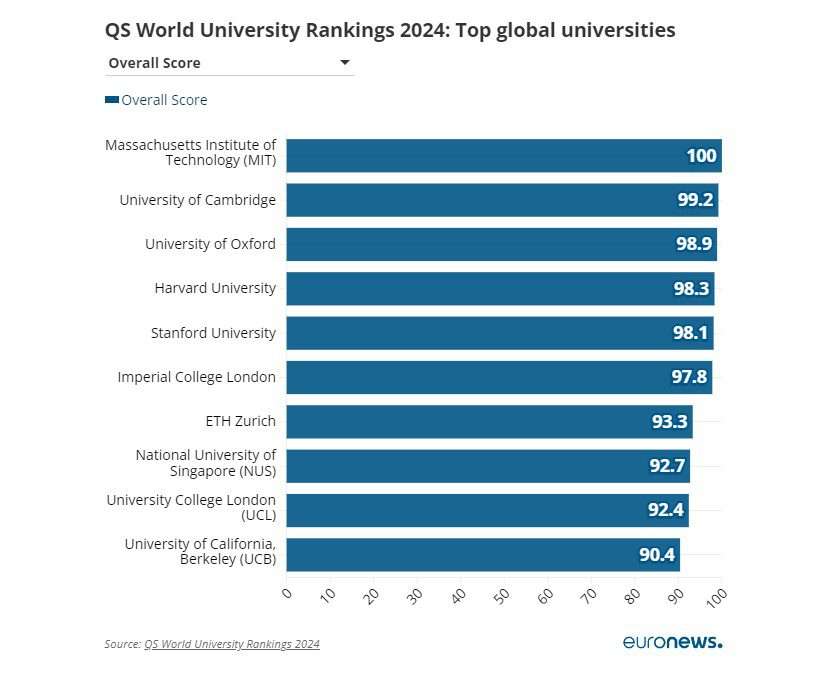
The Massachusetts Institute of Technology (MIT) maintains its top spot in the QS World Rankings 2024 for the 12th consecutive year. European and North American colleges dominate the list.
The 2024 edition of the QS World University Rankings has been released, and half of the top 10 slots are now held by universities in Europe.
The yearly evaluation, which is currently in its 20th year, is based on an examination of 17.5 million scholarly articles and the professional judgment of more than 240,000 academic faculty members and employers from around the world.
Europe claimed five out of the top 10 positions, while English-speaking universities dominate the upper echelons of the rankings with perfect scores in categories such as academic reputation, employer reputation and faculty/student ratio.
The Massachusetts Institute of Technology (MIT) in Cambridge, United States, secured the top spot with a flawless overall score of 100 for the 12th consecutive year.
The University of Cambridge in the UK follows closely behind, claiming second place with 99.2 points, while local rival the University of Oxford secured third place with 98.9 points.
Harvard University took the fourth spot with a score of 98.3, and Stanford University ranked fifth with 98.1 points.

The overall score of the prestigious ranking is reached by considering nine crucial metrics: academic reputation, employer reputation, faculty-student ratio, citations per faculty, international faculty ratio, international students ratio, and, for the first time this year, international research network, employment outcome and sustainability.
The new indicators “reflect the shifts in higher education that have occurred over the past two decades, such as the growing importance of sustainability, employability, and research collaborations,” said Quacquarelli Symonds, the firm analyst behind the ranking.
What trends do the rankings show?
Higher education has undergone significant changes over the past two decades.
"One of the first changes we noticed [in the past decades] was this really increasing focus on employability from students,” said Dr Andrew MacFarlane, QS Rankings Manager, adding that this led them to strengthen the employability focus.
“Students are leaving [university] with higher debt than ever in a really competitive global job market,” he said.
As the ranking celebrates its 20th year anniversary, one trend in which they take “immense pride in is the increasing inclusivity of our rankings, which illuminates the global distribution of academic excellence”.
Between 2018 and the 2024 edition, there’s been a considerable increase in the representation of Asian, Latin American, Middle Eastern, and African universities in the World University Ranking. In 2018, the regions accounted for 37 per cent of the ranking, in 2024, the figure has grown to 46 per cent.
China is becoming a research hub
China, particularly, has seen a marked rise in the rankings, driven by research efforts, MacFarlane noted.
“They're the world's largest producer of research, but increasingly also highly cited research,” he told Euronews Next, meaning the quality of the research being done in China has really “pulled them up” the rankings ladder.
Meanwhile, the United States and the United Kingdom, traditionally strong performers, have experienced a slight decline in rankings, but the dip doesn't necessarily mean they're getting worse. It’s also an indicator that other institutions worldwide are improving and closing the gap, MacFarlane says.
“So, you know, the fastest runner is still the fastest runner, but someone else is closing that gap on their time,” he explained.
EU universities continue to excel in internationalisation metrics
Globally, European universities continue to excel in their global engagement, which is fundamental MacFarlane says, “to break down the world's challenges, you're going to have to work across borders, solve challenges together and be more transparent. And it's Europe that's really leading the way on this”.
Prominent EU institutions showcasing their strength in international research collaboration are Université PSL Paris (Paris Sciences et Lettres University) - which took third place in the ‘international research network category,’ the Sorbonne (4th), KU Leuven and Ghent University in Belgium (6th and 8th respectively), and Université de Montpellier in France (9th).
“So, you might be seeing this sort of increasing dominance in research volume in East Asia in collaborative research and international engagement,” McFarlane noted, “[but] Europe [is] absolutely shining much brighter in that in that case”.
 The Massachusetts Institute of Technology (MIT) maintains its top spot in the QS World Rankings 2024 for the 12th consecutive year. European and North American colleges dominate the list.
The 2024 edition of the QS World University Rankings has been released, and half of the top 10 slots are now held by universities in Europe.
The yearly evaluation, which is currently in its 20th year, is based on an examination of 17.5 million scholarly articles and the professional judgment of more than 240,000 academic faculty members and employers from around the world.
Europe claimed five out of the top 10 positions, while English-speaking universities dominate the upper echelons of the rankings with perfect scores in categories such as academic reputation, employer reputation and faculty/student ratio.
The Massachusetts Institute of Technology (MIT) in Cambridge, United States, secured the top spot with a flawless overall score of 100 for the 12th consecutive year.
The University of Cambridge in the UK follows closely behind, claiming second place with 99.2 points, while local rival the University of Oxford secured third place with 98.9 points.
Harvard University took the fourth spot with a score of 98.3, and Stanford University ranked fifth with 98.1 points.
The Massachusetts Institute of Technology (MIT) maintains its top spot in the QS World Rankings 2024 for the 12th consecutive year. European and North American colleges dominate the list.
The 2024 edition of the QS World University Rankings has been released, and half of the top 10 slots are now held by universities in Europe.
The yearly evaluation, which is currently in its 20th year, is based on an examination of 17.5 million scholarly articles and the professional judgment of more than 240,000 academic faculty members and employers from around the world.
Europe claimed five out of the top 10 positions, while English-speaking universities dominate the upper echelons of the rankings with perfect scores in categories such as academic reputation, employer reputation and faculty/student ratio.
The Massachusetts Institute of Technology (MIT) in Cambridge, United States, secured the top spot with a flawless overall score of 100 for the 12th consecutive year.
The University of Cambridge in the UK follows closely behind, claiming second place with 99.2 points, while local rival the University of Oxford secured third place with 98.9 points.
Harvard University took the fourth spot with a score of 98.3, and Stanford University ranked fifth with 98.1 points.
 The overall score of the prestigious ranking is reached by considering nine crucial metrics: academic reputation, employer reputation, faculty-student ratio, citations per faculty, international faculty ratio, international students ratio, and, for the first time this year, international research network, employment outcome and sustainability.
The new indicators “reflect the shifts in higher education that have occurred over the past two decades, such as the growing importance of sustainability, employability, and research collaborations,” said Quacquarelli Symonds, the firm analyst behind the ranking.
The overall score of the prestigious ranking is reached by considering nine crucial metrics: academic reputation, employer reputation, faculty-student ratio, citations per faculty, international faculty ratio, international students ratio, and, for the first time this year, international research network, employment outcome and sustainability.
The new indicators “reflect the shifts in higher education that have occurred over the past two decades, such as the growing importance of sustainability, employability, and research collaborations,” said Quacquarelli Symonds, the firm analyst behind the ranking.







.svg)

